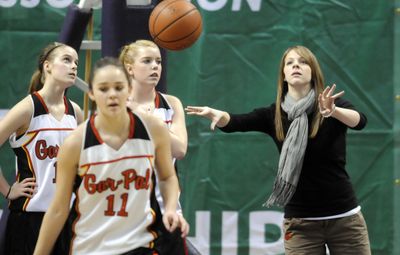Player now courtside after being benched by heart defect
Heart in the game

Emily Boone is matter-of-fact when talking about her defective heart. But talking about basketball is a different matter for the Garfield-Palouse assistant coach.
That’s because it’s her heart that took her off the court and put her on the bench.
Emily, a 17-year-old high school junior, had her career cut short by the discovery that she had long QT syndrome.
“Basically it’s a mechanical deficiency in my heart,” she said Wednesday before a Vikings game at the State 2B girls basketball tournament at the Spokane Arena. “It’s cardiac arrest triggered by adrenalin or stress. It’s hereditary, but no one in my family has it. I got a mutant gene.”
Long QT syndrome can cause sudden death in young people and is one of the arrhythmias that make up sudden arrhythmia death syndromes, or SADS.
“I think they should change the names,” Boone said.
She’d been a three-sport athlete, in basketball, volleyball and track.
“I’ve always been dizzy, my whole life,” she said. “I passed out in math class – it’s stressful for me, I shouldn’t have to take it anymore – but the doctor said I was just growing, it happens.”
That was in November of her sophomore year.
Her mother, Colleen Boone, had a feeling her problem could be serious and took her to see Dr. Cynthia Berg, a pediatric cardiologist, who referred her to Dr. Chris Anderson at Providence Sacred Heart Children’s Hospital, who is on the SADS board of trustees.
“I took a treadmill test, and my life changed,” Emily said of that January day.
Because long QT syndrome can be fatal at any time, including during sleep, some parents shadow their children. Colleen wanted her daughter to live her life.
“The hard part was putting her to bed,” Colleen said. “I prayed a lot.”
It was decided Emily could continue playing, with a defibrillator nearby. “I figured go for it,” she said. “Why live life if it wasn’t worthwhile?”
That’s when, recounting her story, Emily’s tears spilled over.
“We bought a defibrillator for her – they have one at school – and she took it with her all the time until she had one implanted (in May),” Colleen said.
Her father, Tim Boone, a Garfield-Palouse assistant coach, said, “It wasn’t easy to let her keep playing, but it wasn’t as hard as you think. She didn’t have her episodes in practice or games. It was more everyday things. We feel fortunate they discovered it when they did.”
The Vikings went on to win the State 1B championship in Yakima.
“The hardest time was after we won the state championship, everybody was celebrating, me too,” Tim said. “She gave me a big hug and said, ‘Dad, I don’t want this to be my last basketball game.’ I didn’t really think about it before, but I had a pretty good idea it was her last game.”
A few months after the tournament, tests discovered higher risks. Dr. Anderson stopped her activities.
“We’re lucky,” Colleen said. “There are only 100 of these specialists in the United States, and we’re really lucky to have one here.”
Emily has had to find new ways to fill the time three sports used to demand.
“I’m working at the Green Frog restaurant, and that takes up time,” Emily said. She’s also a spectator at events where she used to be a participant. “Me and my sister do yoga. I coach basketball. It’s really not my favorite thing – I’d rather be playing. I’ve learned the coaching perspective. The team has been supportive, helping me feel part of the team.”
Viking coach Steve Swinney said coaching could be in her future.
“She’s got input in everything we do,” Swinney said. “We use her as a real coach. She’s a special kid. She says what’s on her mind, and that’s hard for some kids to do. The players react to her well. They know how she played, 100 percent all the time. They respect that.”
“I’m trying not to think about that now,” Emily said. “I plan to do everything I was going to do all along. I’d rather die happy than live a boring life.”
With his arm around his daughter, Tim said, “She got to go to state twice, finish eighth and win a championship. Not every kid gets to do that.”
Tears on her cheeks, Emily said, “Good ending.”